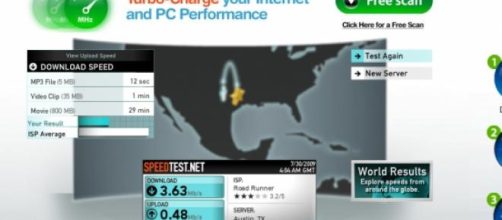In America, where one can find some of the best technology in the world, people expect to have the fastest internet available as well. But do they? Unfortunately, no they don't. As a matter of fact, the United States ranks number 31 across the globe for internet download speeds. The United States is outranked by small countries such as Slovakia, Liechtenstein and the Republic of Moldova. How can that be when Americans have some of the most sophisticated computer and technology companies in the world right in their own backyard?
In the 1990's, the only way for the average American consumer to have internet was through telephone lines.
Dial-up service that moved slowly and worked sporadically, as long as an incoming telephone didn't knock the internet offline was widely used. In 1996, the Telecommunications Act was signed into law.
The Telecommunications Act was supposed to be a way to open the lines that were being used, so that many companies could access the same lines, hence, creating a great competition that would result in lower consumer pricing as well as potentially faster internet speeds and cable programming availability. Unfortunately, this didn't go as planned at all.
By the year 2000 the United States had close to 10,000 individual Internet Service Providers all vying for customers and pricing and efficiency was getting better.
Unfortunately, around the year 2002, deregulation started because the Federal Communications Commission (FCC) decided not to offer the same access to Cable Companies that had been offered to Telephone Companies. Thus began the monopolization of cable internet and the loss of close to 8,000 Internet Service Providers who were unable to access cable lines.
Since telephone internet was remarkably slower than cable internet, telephone companies started losing customers to the cable companies who could provide faster internet speeds for customers. With the fact that cable companies didn't have to allow access to share their lines, monopolies started forming at lightning fast rates. It became very difficult, and expensive, for a new company to be able to handle customers in the same area as another company.
Other countries, many that are much smaller than the United States, have laws that provide complete sharing of lines between various Internet and Cable service providers. With these lax laws throughout the other countries, companies are able to compete for customers and they work hard to provide higher internet download speeds than the others so that they can be more profitable by gaining customers away from the competition.
In the United States, however, since they don't have rules in place that allow or demand sharing of lines, cable companies have no reason to ensure that they speed up their download speeds. They have no competition that would demand it in most places. Therefore, in the United States, there are many areas that have extremely poor internet download speeds and poor service because the demand cannot be forced when the company knows that the consumer has nowhere else to turn for the product.
Perhaps one day, the United States will be able to compete better with other countries when it comes to internet download speed, but that is going to be a long time coming at the rate that they are heading right now. It's going to take severe changes to telecommunication laws, and until lawmakers who don't have their own personal finances sunk into the cable providers, laws will not change at all.

